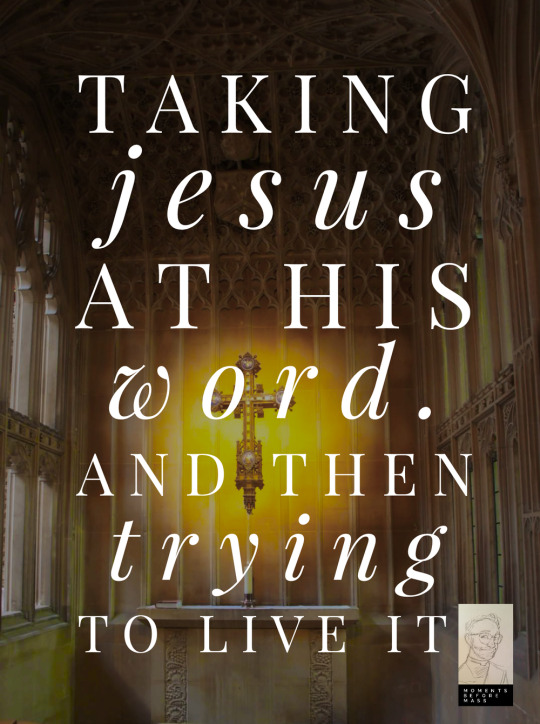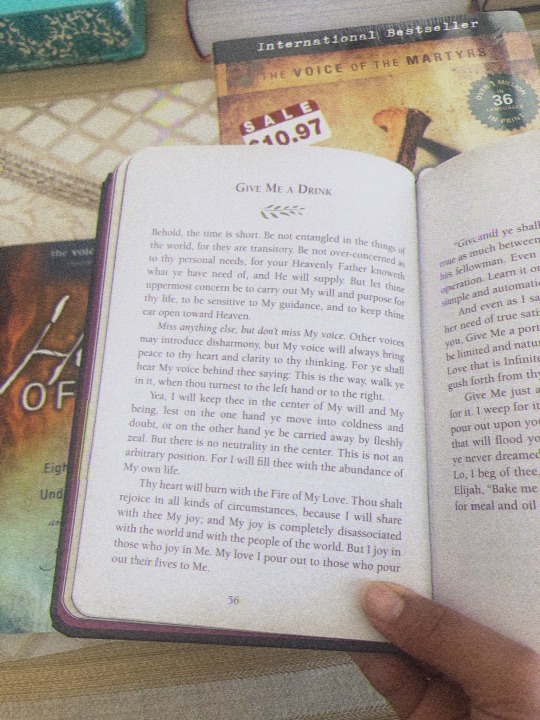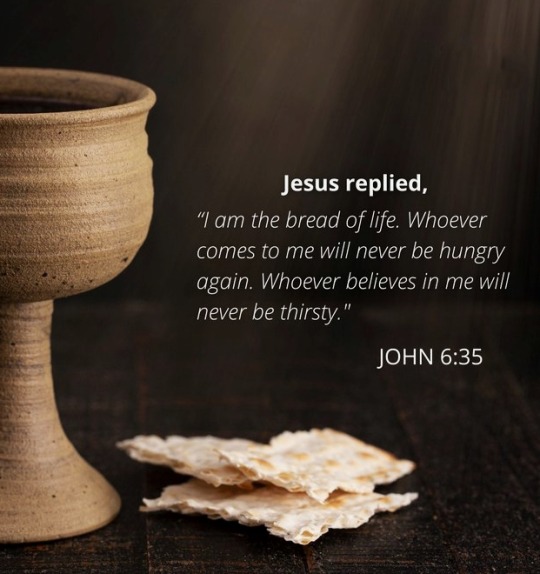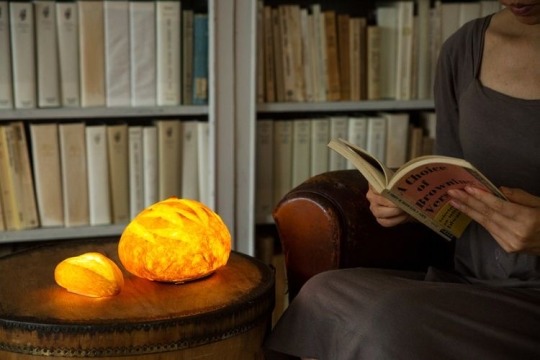#bread of life
Text
2024 APRIL 18 Thursday
"Amen, amen, I say to you, whoever believes has eternal life. I am the bread of life. I am the living bread that came down from heaven; whoever eats this bread will live forever; and the bread that I will give is my flesh for the life of the world."
~ John 6:47-48,51
#bible#verse#scripture#gospel#apostle#saint#John#Amen#God#Lord#Jesus#Jesus Christ#Christ#whoever believes#eternal life#bread of life#living bread#live forever#life of the world
33 notes
·
View notes
Text
How can you tell?

When you read the Bible, you’re going to run into a lot of ideas about it.
Some of them are helpful. Some of them are just weird. Some of them are anything but helpful.
Some of the most harmful? The ones that boil down to making the Bible say what you want it to.
Sadly, no one has a monopoly on abusing the Bible this way. The people who do it come from every political and theological corner you can think of.
One of the worst? Picking and choosing what parts of the Bible to read literally (this happened, here’s what God said, etc.) and what parts to read as allegory or myth (a story is being told to make a point, a legend that reveals something about God, etc.).
Not that we shouldn’t do that. We should read the literal stuff as literal and the allegories as allegory. It’s just that some of the ideas about how to do that are so easily abused.
And easily used to abuse.
So how can you tell?
It’s easier than you think. You don’t need a degree in literature or theology.
Because you’re already doing it. Here’s what I mean:
“A sower went out to so some seed. And as he sowed, some of the seed fell on…”
Right. Before Jesus unpacks it, you know that this one is an allegory. It has that “once upon a time” feel to it.
But even if the farmer was an actual person, that’s not why Jesus is telling the story.
Jesus is not critiquing first century agricultural practices. Jesus is using the story to make a point. And we all know it.
Today’s Gospel is the bread of life discourse, where Jesus tells people that He is the bread of life. And then goes on to explain exactly what He means.
There are a lot of people who want this to be an allegory. For a lot of reasons.
It’s not.
How can I say that? How can you tell that Jesus is being literal about this one?
The reactions it gets. And way the way Jesus responds to those reactions.
The first time Jesus announces that He is the bread of life, no one who heard it understood it as an allegory.
How do I know this? Their reaction – “How can this man give us his Flesh to eat?”
Making it clear that they have it right, that this is no metaphor, Jesus doesn’t explain the symbolism (like He does with the parable of the sower).
Instead (in tomorrow’s Gospel), Jesus doubles down on what He said, on what they’re hanging up on. “Unless you eat the Flesh of the Son of Man and drink his Blood, you do not have life within you.”
Making it clear that they understood Jesus to be speaking literally?
The way that people respond to Jesus doubling down - many of them quit following Jesus and leave.
That’s not how people respond to an allegory. Nobody leaves after Jesus explains the parable of the sower.
If you ever wondered why Catholics are so hung up on the Eucharist? Why we believe what we believe?
This is what’s behind it.
We’re just taking Jesus at His word. And then trying to live it.
That’s the formula for everything that’s right about our Faith. And something we cannot do enough.
Today’s Readings
#Literal#Allegory#Bread of Life#Taking Jesus at His Word#Living the Faith#Eucharist#God#Jesus#Catholic#Christian#Church#Catholicism#Moments Before Mass
27 notes
·
View notes
Text
The news anchor was SHOOK. That 👀 Beyoncé did in the 🎥. She always can spot a camera, LMFAO!!!
🤣😂😭😆
She was there for the Bread of life Inc. (nonprofit organization that has worked to eradicate food insecurity, improve health outcomes, and provide resources to Houston) dedication and groundbreaking ceremony for the re-build of project Knowles-Rowland House in Houston, TX (9/22/23).
#beyoncé#beyonce#beyonce giselle knowles#queen bey#beyhive#celebrity style#fashion#style#style fashion#stylish celebs#bread of life#nonprofitorganization#houstontx#funny videos
9 notes
·
View notes
Photo

(yellowsunflower-me)
36 notes
·
View notes
Text

I am the bread of life. Your fathers did eat manna in the desert, and are dead. This is the bread which cometh down from heaven; that if any man eat of it, he may not die. I am the living bread which came down from heaven. If any man eat of this bread, he shall live for ever; and the bread that I will give, is my flesh, for the life of the world.
The Jews therefore strove among themselves, saying: How can this man give us his flesh to eat?
Then Jesus said to them: Amen, amen I say unto you: Except you eat the flesh of the Son of man, and drink his blood, you shall not have life in you. He that eateth my flesh, and drinketh my blood, hath everlasting life: and I will raise him up in the last day. For my flesh is meat indeed: and my blood is drink indeed. He that eateth my flesh, and drinketh my blood, abideth in me, and I in him. As the living Father hath sent me, and I live by the Father; so he that eateth me, the same also shall live by me. This is the bread that came down from heaven. Not as your fathers did eat manna, and are dead. He that eateth this bread, shall live for ever.
After this many of his disciples went back; and walked no more with him.
'El Salvador Con La Eucaristía' 1550 by Vicente Juan Masip
#John 6#Corpus Christi#Holy Eucharist#Bread of Life#roman catholic#catholic#traditional catholic#christianity#christian
97 notes
·
View notes
Text

September 21, 2022
I stepped into a Jesus book store I remember this day and here I find a book. And as soon as I open a random page on the book, Jesus spoke to me. I was moved in the Spirit because that entire week I fixed my attention on reading John 4.
Jesus is asking of me and you “will you give me a drink?” Are we willing to pour out our lives like a drink offering? To give whatever we have to Jesus.
Lord Jesus I need you more of you. Help me to want you to help me. Help me not to lean on my own understanding, but to stand in the fullness of your grace and walk out your word. I need you so I may walk out in love, abiding and reflecting you Jesus every day more as I walk in this world.
5 notes
·
View notes
Text

#jesus#god#love#truth#motivation#god’s truth#insperation#faith#strength#thank god#holy spirit#growth#jesusistheway#jesusitrustinyou#jesuschrist#jesusislord#belief in jesus#holyghost#bread of life#knowledge#kind#walk with god#will of god#pray#stay prayed up#nofear#the gospel truth#lord jesus christ#jesuscristo#seekgod
11 notes
·
View notes
Photo

John 6:35 (NLT) -
Jesus replied, “I am the bread of life. Whoever comes to Me will never be hungry again. Whoever believes in Me will never be thirsty.
#John 6:35#I am#bread of life#whoever#comes#to Me#will never#hungry#again#believes#in Me#never#thirsty
98 notes
·
View notes
Text








Bread lamp! Lamp bread? Bread lamp? Lamp bread! 🥖💡🥐~~
#bread lamp#lamp bread#bread#lamp#baguette#croissant#daily bread#breadlover#homemade bread#bread of life#baked bread#fresh bread#hot bread#crispy bread#soft bread#&. * ooc. ) sentient bread.#cute bread#🥐#🥖#����#table lamps#night lamp#cute lamp#hot lamp#lamp glow#glow#yellow lamp#yellow lamp glow#💡#artisan lamp
11 notes
·
View notes
Text


17 notes
·
View notes
Text
2024 APRIL 17 Wednesday
"I am the bread of life; whoever comes to me will never hunger, and whoever believes in me will never thirst."
~ John 6:35
#bible#verse#scripture#gospel#apostle#saint#John#God#Lord#Jesus#Jesus Christ#Christ#bread of life#come to the Lord#never hunger#never thirst
12 notes
·
View notes
Text
Bread of life?
(by request, my homily from Corpus Christi)
Why are we so hung up on the Eucharist?
Why do we believe that the world’s most basic cracker (it’s just water and flour) becomes the Body and Blood, Soul and Divinity of Our Lord and Savior Jesus Christ during the Mass?
It starts with Sunday’s Gospel. It’s the heart of the Bread of Life Discourse. Where Jesus calls Himself the bread of life. Then explains what He means. By being completely literal.
A lot people say that this is all symbolic, even some Catholics. How do we know that Jesus is being literal about being the bread of life?
There are a lot of reasons. I’ll only give you three of them.
First, we know that Jesus is being literal because Jesus tells us that He is being literal.
Throughout John’s Gospel, 25 times to be exact, Jesus says, “Amen, amen, I say to you,” to signal that He is speaking directly and being literal. When He wants to be taken at face value.
You and I might say something like, “literally,” or “no, seriously.”
With “amen, amen,” Jesus is doubling down on the meaning. Just like when we say, “for real, for real.”
Which is why, in the Gospel we just heard, when Jesus explains what He means by calling Himself “the living bread that came down from heaven,” He starts His explanation with, “Amen, amen, I say to you.” To make it clear that He’s being literal.
Second, we know that Jesus is being literal because of the style that Jesus uses.
When Jesus wants us to understand something as a metaphor or a symbol, He uses a very specific style to tell us that there’s more going on than just the story He’s telling.
Think of the parable of the sower. It starts with, “A sower went out to sow some seed. And as he sowed, some seed fell by the wayside; and the birds came and devoured them.”
Even before you get to the part where Jesus unpacks the meaning, the style Jesus uses tells us that this isn’t really about first century farming practices. The style tells us that the important part is the meaning behind the story.
Contrast that with today’s Gospel. It starts with, “I am the living bread that came down from heaven; whoever eats this bread will live forever; and the bread that I give is my flesh for the life of the world.”
You don’t need a degree in literature to hear the difference between “a sower went out to sow some seed” and “I am the bread of life.” One of them sounds like a fable – like, “Once upon a time.” The other is a simple, direct statement, mean to be taken at face value – like, “I am wearing shoes.”
Third, we know Jesus is being literal about being the bread of life by the way people reacted.
After the first part of today’s Gospel, where Jesus says, “I am the bread of life?” That made no sense to His Jewish audience. We see that in the Gospel, when they start asking, “How can this man give us His flesh to eat?”
Look how Jesus responds. He doesn’t say, “calm down, I don’t mean it literally, it’s just a figure of speech.”
No, Jesus doubles down on the literal meaning. He says, “Amen, amen, I say to you, unless you eat the flesh of the Son of Man and drink his blood, you do not have life within you.”
If you read the rest of the chapter that comes after today’s Gospel, you find out that they knew Jesus was speaking literally when He doubled down on the whole “bread of life” thing. Why do I say that?
You know they took Him seriously, because they left. Jesus lost a lot of followers when He said, “no, I mean it.” A few verses after today’s Gospel, John tells us, “From that time many of his disciples went back, and walked no more with him.”
And it wasn’t just the Jewish audience who heard Jesus say it that took it literally. The Romans understood this literally as well.
To the point that – in the centuries before Christianity was legalized in the Roman Empire – one of the most common accusations made in Roman courts against Christians was that they practiced cannibalism.
Indeed, it wasn’t until the Protestant Reformation in the 1500’s that anyone seriously questioned whether Jesus was speaking literally here. That was something the early Protestants pushed – well, you know why.
Truth be told, you have to read this Gospel with your mind already made up (and ignore a lot of clues that are right there in the text) to think that Jesus is not speaking literally.
Of course, the great danger in reading today’s Gospel with an open mind is that you might discover the truth.
But how can the world’s most basic cracker be the Body of Christ? You’ve seen it before Mass and after the consecration – there’s no visible difference. It still looks like bread.
If I might translate that question into the thought behind it. When you and I say that, what we’re really saying is this –
I don’t understand it, therefore it can’t be true.
When you boil that statement down to its essence, it easy to see that it doesn’t work. Because it’s nonsense. Here’s what I mean,
Show of hands. How many of us can explain how an internal combustion engine works?
I’m afraid that “put in go-go juice, car go vroom, vroom” isn’t an explanation. So, I’ll have to put my hand down.
Okay, one more show of hands. How many of us got here in a car or truck with an internal combustion engine?
According to the standard of “I don’t understand it, therefore it can’t be true,” that could not have happened. And yet, here we are.
Which tells us what? That however much you and I think we know, there are things that are completely true that you and I do not understand.
Our collective lack of understanding? It has no impact on their truth.
Which is why the fact that you and I don’t fully understand how the Eucharist could be the Body and Blood, Soul and Divinity of our Lord and Savior Jesus Christ has no bearing on the fact that it is exactly that.
As with today’s Gospel, the great danger in approaching the Eucharist with an open mind is that you might discover the truth.
What is the truth? The truth is that the Eucharist is just what Jesus says it is – His Body and Blood, His Soul and Divinity, given for the salvation of the world.
Our Lord and Savior is really, intimately, physically, and personally present in the Eucharist.
Meaning that, in the Eucharist, you and I have the opportunity for the most intimate moment with God that is possible in this life. It’s a deepening of our relationship and connection with God. And a foretaste today, in this life, of the peace and joy and love of God that is waiting for you in eternity.
All that you have to do is approach the One who is waiting for you in the Sacrament with an open heart.
Of course, the great danger in approaching the Eucharist with an open heart is that you might discover the truth.
Sunday’s Readings
#Bread of Life#Corpus Christi#God#Jesus#Catholic#Christian#Church#Eucharist#Body and Blood#Real Presence#Literally#For real for real#Moments Before Mass
12 notes
·
View notes
Text




Tina Knowles made a speech at the Bread of life Inc. (nonprofit organization that has worked to eradicate food insecurity, improve health outcomes, and provide resources to Houston) dedication and groundbreaking ceremony for the re-build of project Knowles-Rowland House in Houston, TX (9/22/23). The Knowles-Rowland House, after suffering from a fire in 2021, has been rebuilt to provide permanent housing to Houstonians in need.
Beyoncé and her pastors Rudy Rasmus & his wife Juanita Rasmus were there too.
#beyoncé#beyonce#beyonce giselle knowles#queen bey#beyhive#tina knowles#bread of life#nonprofitorganization#houstontx
7 notes
·
View notes
Quote
[Jesus] put Himself in a moral category in which He was alone. Everybody else was in darkness; He was the light of the world. Everybody else was hungry, He was the bread of life. Everybody else was thirsty; He could quench their thirst. Everybody else was sinful; He could forgive their sins. Indeed, on two separate occasions He did so, and both times observers were scandalized. They asked, “Why does this fellow talk like that? He’s blaspheming! Who can forgive sins but God alone?” (Mark 2:5-7; Luke 7:48-49). If Jesus claimed authority to forgive the penitent, He also claimed authority to judge the impenitent.
John Stott
#authority#Jesus Christ#supremacy#forgiveness#judge#Bread of Life#sin#sinners#John Stott#Christian Quotes
15 notes
·
View notes
Text
Condensed milk pull apart buns!
https://youtu.be/3raDuGWitSo
youtube

youtube




#youtube#baking#baking bread#bread of life#breadlover#breadmaking#breadtube#daily bread#food#food porn#foodphotography#handmade#homemade#homemade bread#recipe#recipes#bread#foodblogger#milk bread#my video
13 notes
·
View notes
